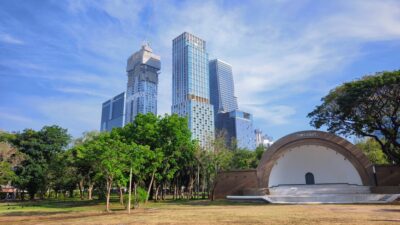Green crusade: The power of data to promote sustainable real estate
This article is based on the Guru Keynote at the PropertyGuru Asia Real Estate Summit originally presented on 8 December 2021.
Data-driven decisions are gaining ground in the real estate sector, and consumers are taking notice

On the 15th of November 2022, the world welcomed its eighth billionth person. And as the hashtag #8BillionStrong trended on Twitter, so did the appeal to promote equal treatment and sustainable development for all.
In the next few years, the United Nations forecasts the population to expand to 8.5 billion by 2030, 9.7 billion by 2050, and 10.4 billion by 2080. Most of these population increases are expected to occur in eight major countries: the Democratic Republic of the Congo, Egypt, Ethiopia, India, Nigeria, Pakistan, the Philippines, and the United Republic of Tanzania — countries that unfortunately lack the solutions, innovations, and resources to keep pace with growth.
Though the Philippines is the only country named in Southeast Asia, over 650 million reside in the region and several millions are relocating to cities in search of a better quality of life. What this means for the real estate industry is the nonstop construction of more residences, commercial centres, educational and medical facilities, and entertainment hubs to cater to people’s needs.
As per the Chief Executive Officer and Managing Director of PropertyGuru Hari Krishnan, particularly for the residential segment, “Tens of millions of them are looking for homes today. They will [keep looking] for decades to come.”
Untapped resources
During Krishnan’s session at the 2021 PropertyGuru Asia Real Estate Summit, he emphasised the immeasurable number of resources the real estate and construction industry has at their disposal, with “tens of billions of dollars spent by investors,” as well as inexhaustible real estate data.
By utilising data science, the real estate sector can anticipate industry trends, reduce potential risks, optimise business strategies, and better understand consumer behaviour. Yet, with all the resources available, the local industry is behind data science, without a trustworthy third-party source that can provide intelligent property decisions to investors, consumers, and property owners.
“Reliable third-party data underpin the multibillion-dollar industries of the markets in North America, Western Europe, and Australia. Our markets should be no different,” maintains Krishnan.
Harnessing data for good
Though the Asian real estate sector may already be accustomed to the current processes, PropertyGuru’s head honcho insists that the sector is not as efficient as it should be, sharing that it can only reach its full potential by adopting workflow automation software and utilising data-driven insights.
“We have the opportunity to transform our workflows from within, making sure that we’re using data-driven insights to make intelligent decisions on how we build and what we build, how we match demand and supply of real estate, and then how we manage the property. Data-driven insights can underpin all parts of the real estate ecosystem,” clarified Krishnan.
Indeed, data science can support all branches of the real estate ecosystem, from aiding urban planners and master developers in the planning phase to offering valuable insights to agents and property seekers during the selling stages, and to property managers after the purchase of a home or commercial space.

The green crusade
The real estate and construction industry is at the forefront of climate action and holds the responsibility to not only reduce its carbon footprint, but to also help property seekers make intelligent decisions.
PropertyGuru is pioneering the drive to help build the industry back stronger, better, and greener.
In 2021, PropertyGuru introduced the PropertyGuru Green Score in its Singapore portal, which attributes a sustainability rating to properties listed. “Through this, we hope to empower consumers to choose sustainable homes that align with their eco-conscious values and continue raising awareness around green living,” said the team in a press release.
This feature will shed light on a project’s sustainability status, proximity to public transportation, and potential awards from the Building and Construction Authority in Singapore and from the PropertyGuru Asia Property Awards series itself.
“We believe there’s an opportunity to build better efficiency, but more importantly, increase the effectiveness of the products that we build for tomorrow. And we look forward to partnering with each of you in building this future together,” concluded Krishnan.
This article was originally published on asiarealestatesummit.com. Write to our editors at [email protected].
Recommended
Meet the expert helping overseas investors crack Australia’s property market
Ivan Lam of property advisors Charter Keck Cramer helps clients navigate Australia’s complex real estate dynamics
6 spots to check out in Singapore’s Bukit list neighbourhood
The sought-after Singapore neighbourhood offers lifestyle amenities, green space, and new residential projects
Thailand’s real estate sector watches closely as the Shinawatras return to power
Time will tell if the return to power in Thailand of the Shinawatras will lift the country’s ailing real estate sector
China’s homebuying surge: Can new stimulus measures keep the market rally alive?
Stimulus measures have sparked a surge in homebuying activity around China, but many are sceptical the shift will endure








